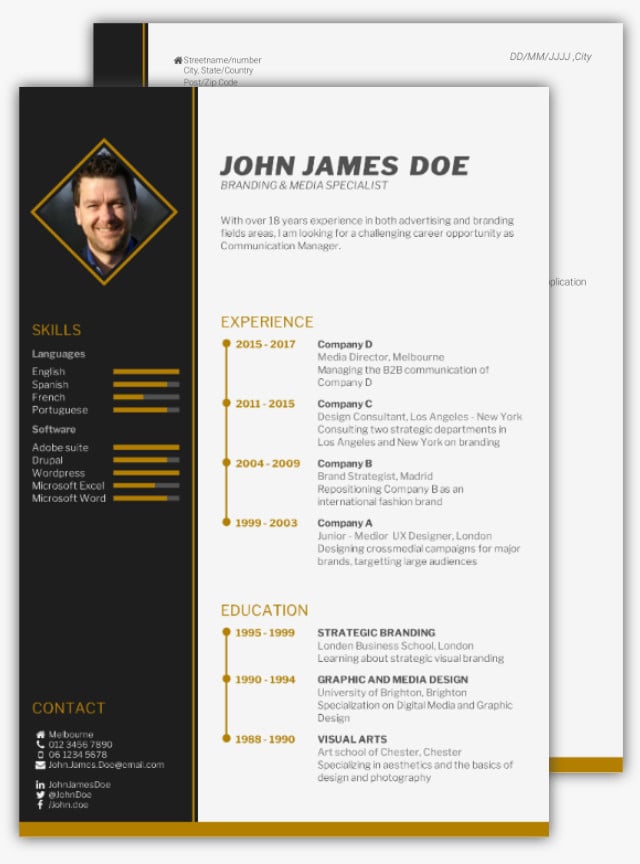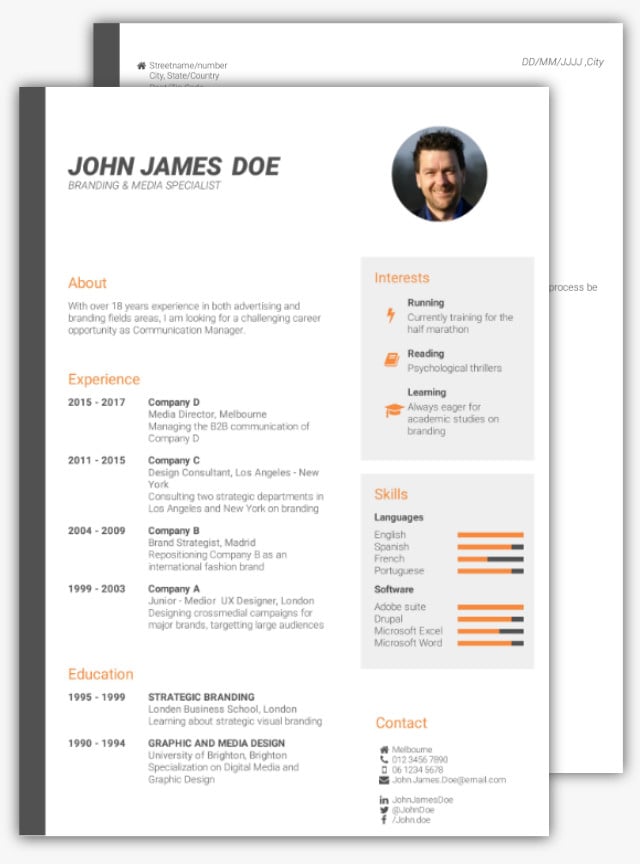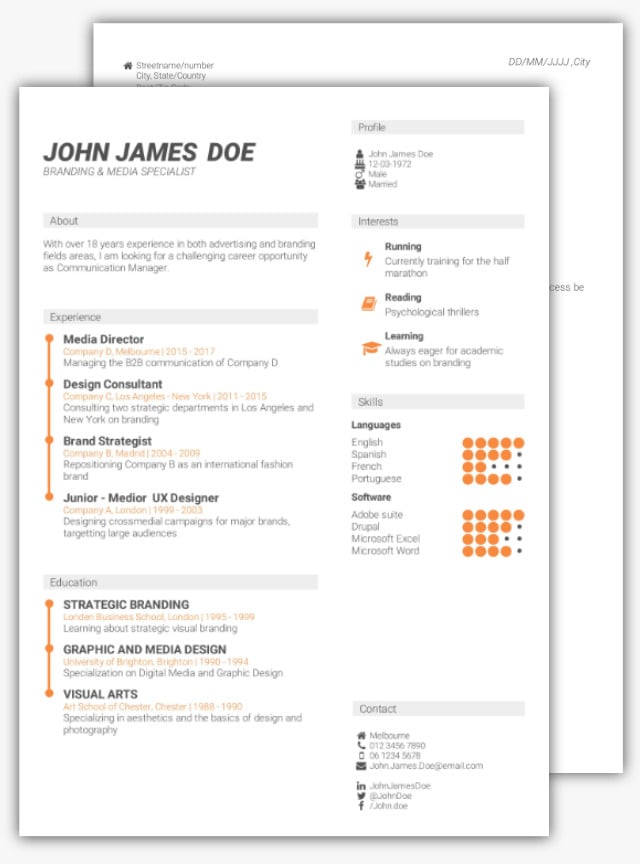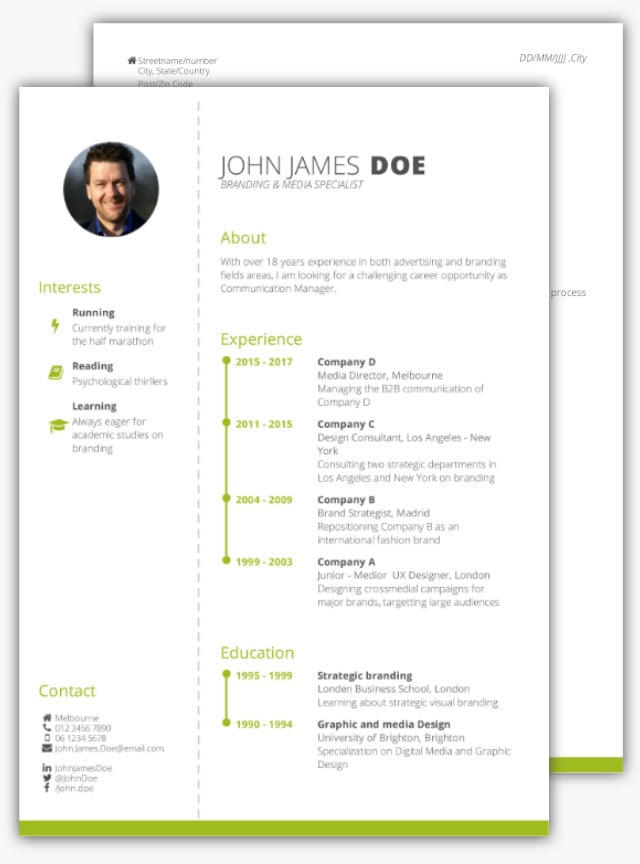Strengths vs Skills vs Competences

Strengths, skills and competences…
We all use them interchangeably from time to time.
But is there an actual, real difference?
And does it matter?
Well… ABSOLUTELY!
You see… Recruiters are actively looking for suitability.
They seek confirmation in skills, competences and strengths as a whole.
It’s called strength-based recruitment.
The goal is simple. Find out if the job is something for you.
Use strengths, skills and competences the right way and you will gain an amazing CV ADVANTAGE!
“So I just have to add a strength section and list the right strengths?”.
Well… think broader. These qualities can also be found in your hobbies… your achievements… even in your career choices!
By knowing the desired qualities the recruiter is looking for you can DESIGN your CV accordingly.
You will be able to PLAN what the recruiter will think about you.
Do it right and your job interview will almost be GUARANTEED.
The differences between strengths, skills, competences
So… what are the differences between skills, competences and strengths?
In short:
- A strength is something you are naturally good in and didn’t have to learn. Think about character traits like curiosity or social intelligence.
- A skill is something you can learn (and master) through repetition.
- A competence refers to skills and knowledge while being more than just the skill or knowledge itself. It includes ability and behaviour.
While C++, Java or PHP are learned programming skills, being a logical thinker is a competence.
Got it?
With strengths vs competences it gets a little fuzzy as they are both about human behaviours.
Their difference is in their nature.
Competences are a combination of skills, knowledge and habits that demonstrate a behaviour.
Strengths are about our natural way of doing. Think behaviours such as thinking and feeling.
Competences are external while strengths are internal. You could say that competences are the outcome of your strengths.
Strengths do not change over time where competences can.
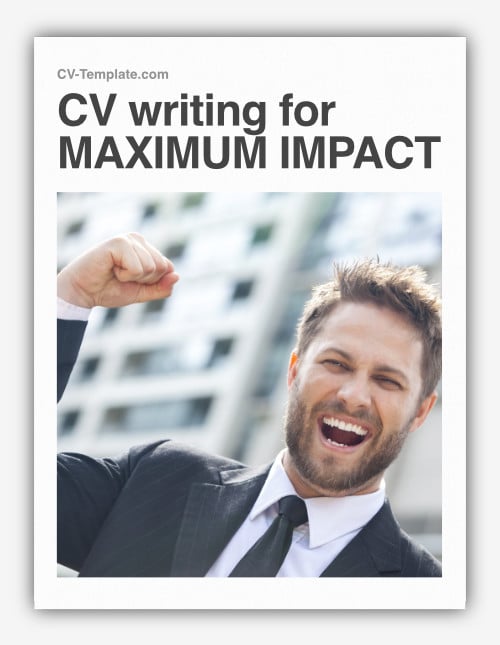
Learn how to write your CV for MAXIMUM IMPACT!
How to use skills, competences and strengths in your CV
Now that you know the differences, let’s look at how you can turn each in your strategic ADVANTAGE.
- Skills are a great way to highlight your direct value to the organization.
- Competences give a more personal touch to the CV and an insight into your character. They are especially useful with personal-based CV’s or with jobs that are constantly changing.
- Strengths are ideal to show that you are ‘the right type of person’. You are creative, disciplined, enthusiast, trustworthy, patience, and thus can deal with…
Ask yourself what your future employer is looking for.
Does he need your hard skills? Your abilities? Your personality?
Is your current skill set the exact answer for them or is the company looking for a broader set of competences that will make you a perfect fit for the job?
How to use skills, competences and strengths in my free CV builder
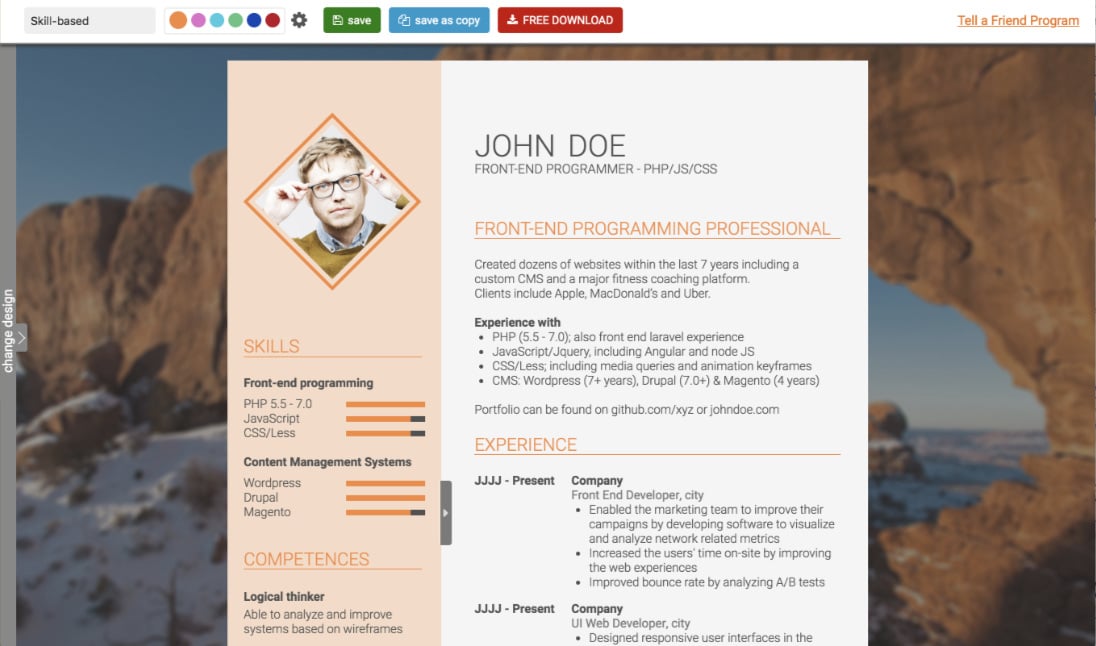
➣ Take the free CV quiz to determine your best CV format.
Here’s how to write your Skill-based CV effectively.
Look at my free professional cv templates and you’ll see that most have a sidebar. That’s not just for the slick look.
Including a sidebar in your CV has a big PSYCHOLOGICAL BENEFIT.
Whatever is highlighted in this sidebar will draw the attention in the first few seconds, setting the context for the rest of your CV.
By controlling these first few critical seconds, you are determining what the recruiter will focus on. You PLAN how he will review your CV.
Everything else is to back these expectations up.
It’s simple. Highlight your skills, competences or strengths in the sidebar. Describe these skills in-depth in the CV summary and you’re set.
You’ll stand out immediately. Just by using a sidebar cleverly.
Choose Your Free CV TemplateThe CV templates support both skills (rating bar), competences and strengths. You’ll love it.
Just pick a design and create a professional-looking CV in no-time.
How to choose the right CV Skills
So… What skills will get you more interviews? How can you determine what skills the recruiter is looking for?
Moreover, how can you implement them effectively in your CV?
Relevant key skills together with your achievements are THE most important CV aspects.
Skills show your abilities. Achievements prove that you have done that before. Impressive achievements will inspire the employer to think big WITH YOU in the spotlight (making yourself irreplaceable).
Naturally, choosing the RIGHT, RELEVANT skills/achievements matter.
That's why you have to know first what the job REALLY is about. What is the problem that your desired position solves for the company?
Find as much information as you can. What is important for the job?
What is the one skill that will make a difference?
- Search for key skills within the job qualifications section of the job description. Often they are already listed!
- Copy the exact terminology of the employer. The recruiter will scan for these terms within your CV and you will make sure to pass the applicant tracking software.
- Ask a person in the desired position what skills he/she possesses! This will give you major insights into what is important for the job. Do it. Your job interview will be A LOT easier.
- Using 4 required skills (80%) and 1 skill (20%) you think is important (but not written within the job description) happens to be the best ratio of 'written to the job while staying realistic'.
Choose your skills wisely, and don’t list every skill you can think of.
How many CV skills should you choose? MAXIMUM 6. Focus on maximum 6 skills and you will be PERCEIVED as an EXPERT.
The employer hires to solve a SPECIFIC problem. Be the ‘go-to-person’ for that particular problem by having a targeted skill set.
Don't be the GENERALIST that ‘know-it-all’.
State too many skills and your skills will become unrealistic and meaningless. Stay focused on the important few.
Psychological hack: When using a skill list in your CV, place your BEST skills at the first 2 AND the last position. The recruiter will remember them the most.
So when having 5 skills. Start with the 2 best skills, followed by 2 ‘important-but-not-the-best’, and end with your third best skill.
Anything less than ‘important skill’ does not deserve a place on your CV.

Learn how to write your CV for MAXIMUM IMPACT!
Hard Skills vs Soft Skills
Not all skills are equal. There’s a difference in so-called hard skills (skills that are hard to learn) and soft skills.
For example
Knowing how to code in a programming language (hard skill) is totally different from having good communication skills (soft skill).
Hard and soft skills need totally different approaches to be effective. That’s why so many people screw up.
Hard skills are more technical in nature and focus on the abilities you need to possess to do a specific job.
If you are a programmer, programming in that specific language will be your key hard skill.
Graphic Design, languages, copywriting and mathematics are all hard skills.
Soft skills are social skills that are linked to your emotional intelligence.
Communication, time-management and leadership are such soft skills.
The problem with soft skills is that they are hard to demonstrate.
The hard truth is that they are meaningless statements without proof.
On the other hand, they can be of a big importance to the job.
How to handle hard and soft skills
While stating a list of your hard skills is totally acceptable, soft skills need another approach.
With soft skills, you need to SHOW PROOF of these skills, making them grounded.
Are you a natural leader? Show them your leadership achievements!
Are you disciplined? Show them by describing an individual sport.
‘Training to run the New York marathon’ proofs immediately that you are disciplined! Click here for a full list of clever CV hobbies.
While soft skills alone are just empty statements to the recruiter, showing them with proof in the work description is more impressive than writing only the required hard statements.
Beware of the highly desired ‘leadership’, ‘project management’, ‘detail-oriented’, ‘hard-working’, ‘good communication’ and ‘team player’ skills.
Only state them with proof as they are over-used and otherwise just an opinion. Recruiters have seen hundreds of ‘hard-working team players’!
Within your CV, you might want to highlight key skills by making them bold. Just select the text in my CV builder and a style menu will appear.
Stand out with your CV Skills
While my CV templates contain beautiful rating bars to make your skills stand out, a different strategy is to describe your skills in more detail.
Be specific. Show the recruiter that you know what you are talking about.
Instead of ‘Microsoft Excel’, write the skills far more detailed. Select solely aspects that are relevant to the job.
How about…
- Excel - advanced (Power View, PivotTable, Instant Data Analysis).
- PHP (5.5 - 7.0); also front-end laravel experience (5.4 - 5.6)
You will be perceived as credible instantly!
Make sure to have some examples ready for the job interview. They will ask for details.
Including competences in your CV
Are you lacking the exact hard skills that are required for the job?
Take a step back and design your CV on a higher level.
Don’t focus on specific skills. Impress the recruiter with matching competences that ARE related to the job instead.
Are you a programmer but lack a specific language? Focus on being a logical thinker and a quick learner.
Maybe you do miss the skill. But if you are able to learn quickly, it doesn’t have to be that big of an issue.
Do you have the mindset, abilities or general knowledge that is of value to the job? Focus on these job-related competences instead.
The big advantage of competences is that they can distinguish you from other applicants.
You can promote yourself on a higher level instead of focussing on being an expert in a small field. Show the recruiter that you are capable of so much more!
Clever CV competences to use are:
- Finding creative solutions
- Technical/Scientific thinking
- Research skills (broader than just one skill)
- Training/Educational skills
- Social Responsibility
- Leadership skills
- Critical thinking
- Personal management
- Teamwork (only when backed-up by evidence!)
In my CV Builder, include a description field under every competence. The recruiter must understand the intention or your competence.
Make sure the recruiter understands how the competence is a benefit to the company. Also, try to include proof of your competences in your CV!
Are you creative? Link to some examples of your creative work!
You can easily add a description field in my CV builder by hovering the element and clicking on the settings cog.
What are some of your greatest strengths?
We all know the classic question that always turns up at some point in your career. Probably during your next job interview.
“What are some of your greatest strengths?”.
How about answering it with the RIGHT strengths the next time?
And… how about integrating some of them into your CV?
According to Jack Bergstrand, there are only four distinct families of strengths: visualizers, prioritizers, organizers and energizers.
Choose the strengths that are appropriate to the job’s strength-family and you will immediately pass this personality test.
I’ll explain them.
People with the subjective ‘visualizer’ strength are visionaries that solve problems by asking ‘where do we intend to go and why’.
They love thinking outside the box and hate repetitive work. This strength is essential in roles like marketers, strategists and CEOs.
People with the ‘prioritizer’ strength are more objective and focusses on facts. They are numerical and highly structured thinkers and are great planners.
Their typical question is ‘what do we need to do and when?’. This strength is essential in roles like planners, accounting, analysts and CFOs.
People with the ‘organizer’ strength are also more objective. They focus mainly on facts and figures.
Organizers are process-oriented, love systematizing and think mainly about ‘how do we do that’.
Typical roles with this building strength can be found in logistics, IT, manufacturing and management.
Lastly, people with the ‘energizer’ strength love human interactions, are great at inspiring others and focusses mostly on the 'Who'.
They are great as coaches and winning (convincing) customers. Their typical roles are salespeople and mentors.
Finding your strength family
It is critical to know your strength family so you can choose your career path accordingly.
Believe me. You don’t want to get dragged into areas (jobs) where you can’t add a lot of value and therefore are unhappy!
To find your strength family, it is important to know what interests and satisfies you. Then ask yourself what strengths derive from them.
- What activities give you the most satisfaction and happiness?
- Where did you focus on most in previous jobs?
- Where do you add the most value?
- Where do you get admired for?
Each strength family has its own common set of natural characteristics/strengths. Such a set of related strength is the most effective answer to the famous question!
‘Visualizer’ strengths:
- Strategic thinking (being strategic)
- Focus on the long-term destination
- Setting a visionary destination
- Establish a positive future in the mind of others
- Inventive thinking/problem solving
- Conceptualize possible solutions
- Creative thinking (being creative)
- Suggest new thoughts that others have not considered
- Pioneer new ideas
- See and try new possibilities/opportunities
- Brainstorming
- Work with others to co-create new ideas/solutions
‘Prioritizer’ strengths:
- Analysing and managing information
- Conceptually break down a situation to understand each part
- Define clear policies
- Establish clear guidelines to help people work in an unified way
- Define objectives
- Create explicit goals to direct the work of teams/individuals
- Plan budgets
- Control the allocation of resources
- Establish performance measurements
- Create an evaluating mechanism to check if goals are achieved or not
- Judge performances objectively
- Independently weigh facts to evaluate performance results
- Objective decision-making
- Gather the necessary information to make choices objectively based upon
- numbers/quantitative measurements
’Organizer’ strengths:
- Implement standard processes
- Get work done effectively using repeatable actions
- Implement step-by-step procedures
- Get work done by using a set of instructions
- Implement projects
- Effective execute a set of planned activities
- Implement integrated programs
- Holistically achieve a series of projects
- Implement proven methods
- Improve enterprise performance by well-established procedures
- Implement practical solutions
- Solve problems by using proven tools and techniques
- Implement roles and responsibilities
- Execute activities through the organizational structure
’Energizer’ strengths:
- Build personal relationships
- Connect with individuals/groups on an emotional level
- Team work
- Work effectively in a team, subordinate yourself to achieve goals as a team better
- Coaching/mentoring
- Enable and facilitate learning, help people contribute more by facilitating their own personal growth
- Supporting others
- Help people to achieve goals/encounter problems
- Relating to people
- Build relationships based upon commonalities
- Communicating
- Make an interpersonal understanding, e.g. team members, dealing with customers, selling, presentations, negotiation.
- Flexible and adaptable. Adapt easily to a dynamic environment to achieve better results
- Motivating and inspiring
Using your set of natural strengths will distinguish you from other candidates AND recruiters are actually searching for them.
Implement some of these character traits into your CV and the recruiter will confirm your fitness for the position.
Choosing between CV strengths, skills and competences
Are you still in doubt about where to focus on? Would it be most beneficial to use strengths, skills or competences in your CV?
Let me help you out.
- If the job is technical or requires a certain (hard) skillset: definitely go for the skills section.
- If the job is more about people or your personality is important: go for competences and/or strengths.
- If you do not possess the exact skill but have related competences: include competences.
- If the function has a perfect fit within a strength family: consider using a strengths section (choose the competences section within my free cv builder and rename it).
It does not matter what you choose, ALWAYS include some strength characteristics in CV descriptions to PROOF that you are a suitable candidate.
Do it. Help the recruiter discover what kind of person you are. SHOW that you are a great fit for the job. You’ll have a big advantage!
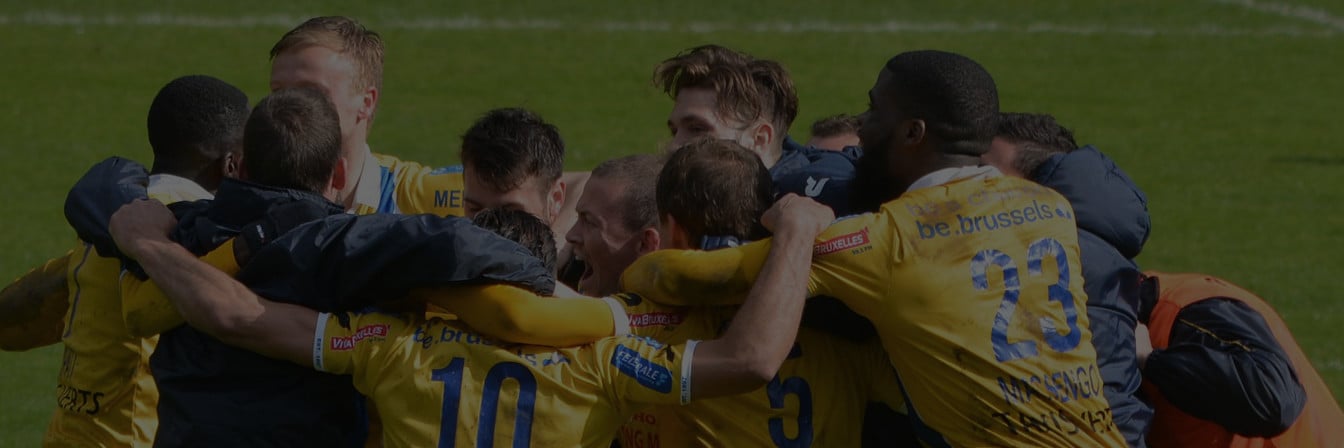
Use this CV section cunningly, SHOWING the employer why you are the best hire!



